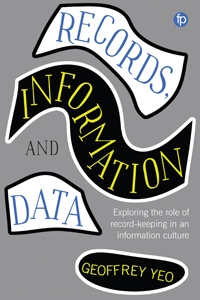
Primary tabs
You don't need to be an ALA Member to purchase from the ALA Store, but you'll be asked to create an online account/profile during checkout to proceed. This Web Account is for both Members and non-Members. Note that your ALA Member discount will be applied at the final step of the checkout process.
If you are Tax-Exempt, please verify that your account is currently set up as exempt before placing your order, as our new fulfillment center will need current documentation. Learn how to verify here.
- Description
- Table of Contents
- About the author
- Reviews
This dynamic book considers whether and how the management of records (and archives) differs from the management of information (and data).
Can archives and records management still make a distinctive contribution in the 21st century, or are they now being dissolved into a wider world of information governance? What should be our conceptual understanding of records in the digital era? What are the practical implications of the information revolution for the work of archivists and records managers?
Geoffrey Yeo, a distinguished expert in the global field, explores concepts of "records" and "archives" and sets today’s record-keeping and archival practices in their historical context. He examines changing perceptions of records management and archival work, and asks whether and how far understandings derived from the fields of information management and data administration can enhance our knowledge of how records function. He argues that concepts of information and data cannot provide a fully adequate basis for reflective professional thinking about records and that record-keeping practices still have distinct and important roles to play in contemporary society.
Introduction
- Concepts of information, data and records
- Background to the book
- Structure and content
- Acknowledgements
1. The making and keeping of records: a brief historical overview
- Record-making and record-keeping over 10,000 years
- Records, memory and evidence
- Repositories and their curators
- Archivists and the emergence of records management
2. Thinking about records and archives; the transition to the digital
- Fixity and fluidity in the digital domain
- Adventures over time
- Record aggregations
- Archival mind-sets
- Information: a fifth paradigm?
3. Archivists, records managers and the rise of information
- Accentuating information in contemporary culture
- Records management and information governance
- Information and archives
- Making connections between records and information: diverse views
- Managing information ‘as a record’
4. Finding a way through the hall of mirrors: concepts of information
- Information and its reification
- Records management and new concepts of information
- Information as content or information as affordance?
- Dissent and debate
5. Records and data
- The ‘datafication’ of records
- Further perspectives on data and record-keeping
- Data and information: some conflicting views
- Factuality
- Contested concepts
6. Representation, performativity and social action: why records are not (just) information
- Representations
- Speech acts
- Propositions and performativity
- Data, computers and the making of speech acts
- Metadata
- Doing things with records
- From speech acts to social acts
- The ‘information potentials’ of records
- Information, evidence and other affordances
7. Managing information or managing records?
- Conceptions and practices of ‘information management’: information as proposition
- Information management and records management: two peas from different pods?
- Making use of records despite their imperfections
- Knowing ‘what was said’
- Characteristics of records and information
- ‘Authoritative’ records and the scope of record-keeping
Concluding thoughts: record-keeping present and future
- The digital deluge
- Records in an information culture
Geoffrey Yeo
Geoffrey Yeo is an Archives and Records Management specialist at the Department of Information Studies, University College London.
"Overall, this work focuses on the business case for records management and provides clear guidance for how records can best serve business purposes ... Recommended for undergraduates and graduate students interested in records or information management."
— CHOICE


